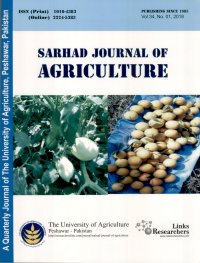Does IPM Based Production Significantly Different from Conventional Production: A Case Study of Punjab, Pakistan
Does IPM Based Production Significantly Different from Conventional Production: A Case Study of Punjab, Pakistan
Saima Akhtar Qureshi1 and Asim Anwar2*, Ather Maqsood Ahmed3
ABSTRACT
Doubt about pesticides based agriculture productivity motivated agriculture departments to collaborate with international agencies to introduce sound agriculture practices like Integrated Pest Management (IPM) in Pakistan. In IPM technique natural parasites and predators are used to check pest growth instead of pesticides which reduces ecological and health damage. Pesticides are used at the last resort in IMP method so it reduces the cost of production and increases the farmers’ profit. However, concerns about production may hinder widespread adoption of this technology by farmers. The aim of the study is to evaluate economic feasibility of IPM method in Punjab. The study consisted of 326 farmers (161 IPM producer and 165 NON-IPM producers) and compared input and output outcomes of IPM and NON-IPM farms and provided a detailed evidence of overall production of both farms. The results suggest that IPM farms yield 4.8 percent higher output/hectare than NON-IPM farms and used3.6 percent lower inputs.
To share on other social networks, click on any share button. What are these?







